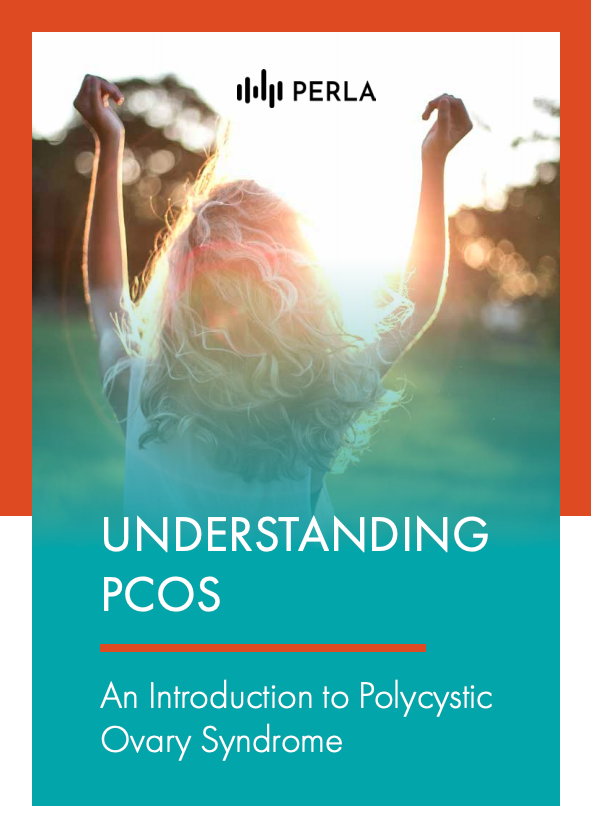Getting pregnant can be a very exciting time for women with PCOS. You may have heard that for women with PCOS, the risk to miscarry is higher than for those without the syndrome. While this may sound alarming, we want to make sure you know why this is the case, and how to increase your chances of a healthy pregnancy. It is key to be in close contact with your OB-GYN/Gynecologist and PCOS care team, especially when you plan to get pregnant or are pregnant, and ask them about any concerns or questions you might have.
Polycystic Ovary Syndrome and Miscarriage
Whether you have PCOS or not, every pregnancy carries risk. The risk for miscarriage or early pregnancy loss is about 10-15% in non-PCOS women. In women with PCOS, however, the risk is about three times the normal risk.1,2
Many specialists believe that the rate of early pregnancy loss in PCOS women is due to other related factors, including a higher incidence of insulin resistance, hyperandrogenemia, and obesity. Several theories have been proposed to explain the increased risk of miscarriage in PCOS,3 but the exact cause of the association is not known.
- Obesity: increases the risk of spontaneous miscarriage in patients who received fertility treatments.4
- Fertility treatments: increased miscarriage rate is observed in women with PCOS undergoing IVF and those treated with ovarian induction agents.5
- Hyperinsulinemia: elevated levels of insulin in the blood is a common feature of PCOS. Obesity contributes to hyperinsulinemia, affecting miscarriage rates in PCOS.6
- Luteinizing hormone (LH): inappropriately raised LH appears to increase miscarriage in several reports due to abnormal follicular development and anovulation.7,8
- Endometrial dysfunction: various studies suggest that PCOS causes inadequate endometrial blood flow, probably due to hyperinsulinemia.9
Other Pregnancy Complications
Infants born to mothers with PCOS were more prone to weigh more than average and were at increased risk of meconium aspiration syndrome and having a low APGAR score.10 APGAR is a quick test used to evaluate a newborn baby’s health.
After the first trimester, women with PCOS commonly encounter late-pregnancy complications like gestational diabetes, pregnancy-related high blood pressure, pre-eclampsia, premature delivery, and small for gestational age (SGA) infant.11
The Role of Metformin in Reducing Miscarriage Risk in PCOS
Metformin belongs to the family of drugs called biguanide used to reduce the production of glucose in type 2 diabetes mellitus. Evidence from various studies supports the use of metformin to treat PCOS symptoms and to reduce the frequency of miscarriage and gestational diabetes.
Metformin decreases high insulin levels and high male hormone levels, decreases fatty liver formation, and reduces risk factors for heart problems and clotting. Continued use during the first trimester may reduce the risk of spontaneous miscarriage. A recent placebo-controlled study suggests that the metformin lowers the risk of early pregnancy loss and preterm birth in pregnant women with PCOS.12 However, the popular biguanide appeared to have no effect in lowering the risk of gestational diabetes.
In addition, several studies have not confirmed that metformin can reduce miscarriage risk, so further research is necessary to establish its role in preventing pregnancy complications.13,14
Tips for a Healthy Pregnancy
The best way to make sure you have a healthy baby is to look after your own body. This holds true when you are trying to conceive and during pregnancy. Lifestyle changes such as diet and exercise significantly improve pregnancy outcomes in women affected by PCOS.
For women with PCOS who are overweight or obese, a weight reduction of 5-10% is advised and has shown to improve ovulation and future pregnancies. Losing weight before conception is recommended to reduce complications.
However, some experts believe that if you are older than 35 and have been trying to get pregnant for more than a year, time is more important than losing weight. Although weight loss increases your chance of getting pregnant and reduces the risk of metabolic complications, you may not want to delay fertility treatments while you are trying to lose weight.
Below are some tips for a healthy pregnancy:
- A 30-minute exercise five times per week is recommended for weight control. Exercising helps even when weight is not lost.15 However, you should avoid strenuous physical activities. Check with your fertility specialist before exercising as some fertility treatments will require you to limit your activity.
- Medicines should be kept to a minimum. If you’re consulting a doctor for another problem, tell them that you are pregnant. Some medications are considered safe in pregnancy, others are not. Make sure to discuss all of your medications and supplements with your doctor, and ask if they are safe for pregnancy.
- Take prenatal vitamins prescribed by your obstetrician. Your doctor may recommend a multivitamin with folic acid a month before you start trying to get pregnant. Folic acid reduces the risk of brain and spinal cord defects in developing babies if you start taking it before pregnancy.
- A diet tailored to your physical requirements should be carefully planned with your doctor and dietitian. It should be high in complex, low glycemic carbohydrates such as whole grains, leafy green vegetables, and beans, low in cholesterol and fats, and moderate in proteins. Lots of dietary fiber is important since it can reduce insulin requirements in diabetic pregnancies.
- Maintain a healthy blood glucose level before and during pregnancy. Effective treatment for preventing gestational diabetes include frequent blood sugar monitoring, healthy eating plan, insulin injections (if required), and regular physical activity.
- Limit your intake of caffeinated beverages such as coffee, tea, soda, and hot chocolate. High doses of caffeine can increase miscarriage risk or result in babies having low birth weight. Pregnant women can have up to 200 mg of caffeine a day; that’s equivalent to 2 mugs of instant coffee.
Talk to your OB-GYN/gynecologist or care team about all of your concerns and open questions, and ask for their advice for your specific situation, as they can support you best on your journey. Listen to their advice carefully, so you know of the risks and can plan ahead, and get in touch with them immediately if the situation requires it.
Sources:
- Gray RH, Wu LY. Subfertility and risk of spontaneous abortion. Am J Public Health. 2000;90:1452–4
- Kjerulff LE, Sanchez-Ramos L, Duffy D. Pregnancy outcomes in women with polycystic ovary syndrome: a meta-analysis. Am J Obstet Gynecol 2011;204:558.e1-6.
- Kamalanathan S, Sahoo JP, Sathyapalan T. Pregnancy in polycystic ovary syndrome. Indian J Endocrinol Metab. 2013;17(1):37-43. doi:10.4103/2230-8210.107830
- Wang JX, Davies MJ, Norman RJ. Obesity increases the risk of spontaneous abortion during infertility treatment. Obesity Research. 2002;10(6):551-554. doi:10.1038/oby.2002.74
- Tummers P, De Sutter P, Dhont M. Risk of spontaneous abortion in singleton and twin pregnancies after IVF/ICSI. Human Reproduction. 2003;18(8):1720-1723. doi:10.1093/humrep/deg308
- Essah P, Cheang K, Nestler J. The pathophysiology of miscarriage in women with polycystic ovary syndrome. Review and proposed hypothesis of mechanisms involved. HJ. 2004;3(4):221-227. doi:10.14310/horm.2002.11130
- Fawn BC. Observation in favour of normal early follicle development and disturbed dominant follicle selection in polycystic ovary syndrome. Gynecol Endocrinol. 1994 Jan;8(2):75-82.
- Shanmugham D, Vidhyalakshmi RK, M. SH. The effect of baseline serum luteinizing hormone levels on follicular development, ovulation, conception and pregnancy outcome in infertile patients with polycystic ovarian syndrome. Int J Reprod Contracept Obstet Gynecol. 2017;7(1):318. doi:10.18203/2320-1770.ijrcog20175869\
- Jakubowicz DJ, Seppälä M, Jakubowicz S, et al. Insulin reduction with metformin increases luteal phase serum glycodelin and insulin-like growth factor-binding protein 1 concentrations and enhances uterine vascularity and blood flow in the polycystic ovary syndrome 1. The Journal of Clinical Endocrinology & Metabolism. 2001;86(3):1126-1133. doi:10.1210/jcem.86.3.7295
- Roos N, Kieler H, Sahlin L, Ekman-Ordeberg G, Falconer H, Stephansson O. Risk of adverse pregnancy outcomes in women with polycystic ovary syndrome: population based cohort study. BMJ. 2011;343(oct13 1):d6309-d6309. doi:10.1136/bmj.d6309
- Boomsma CM, Eijkemans MJC, Huges EG, et al. A meta-analysis of pregnancy outcomes in women with polycystic ovary syndrome. Hum Reprod Update 2006;12:673-83. for the european society of human reproduction and embryology(Eshre). Hum Reprod. 2018;33(9):1586-1601. doi:10.1093/humrep/dey242
- Løvvik TS, Carlsen SM, Salvesen Ø, et al. Use of metformin to treat pregnant women with polycystic ovary syndrome (Pregmet2): a randomised, double-blind, placebo-controlled trial. The Lancet Diabetes & Endocrinology. 2019;7(4):256-266. doi:10.1016/S2213-8587(19)30002-6
- Morin-Papunen, L., Rantala, A. S., Unkila-Kallio, L., Tiitinen, A., Hippeläinen, M., Perheentupa, A., et al. (2012). Metformin improves pregnancy and live-birth rates in women with polycystic ovary syndrome (PCOS): A multicenter, double-blind, placebo-controlled randomized trial.
- Journal of Clinical Endocrinology and Metabolism, 97(5), 1492–1500. American College of Obstetricians and Gynecologists. (2014). Preeclampsia and high blood pressure during pregnancy. Retrieved May 23, 2016, from http://www.acog.org/~/media/For%20Patients/faq034.pdfexternal link (PDF 452 KB)
- Balen AH, Morley LC, Misso M, et al. The management of anovulatory infertility in women with polycystic ovary syndrome: an analysis of the evidence to support the development of global WHO guidance. Hum Reprod Update 2016; 22(6): 687–708.


